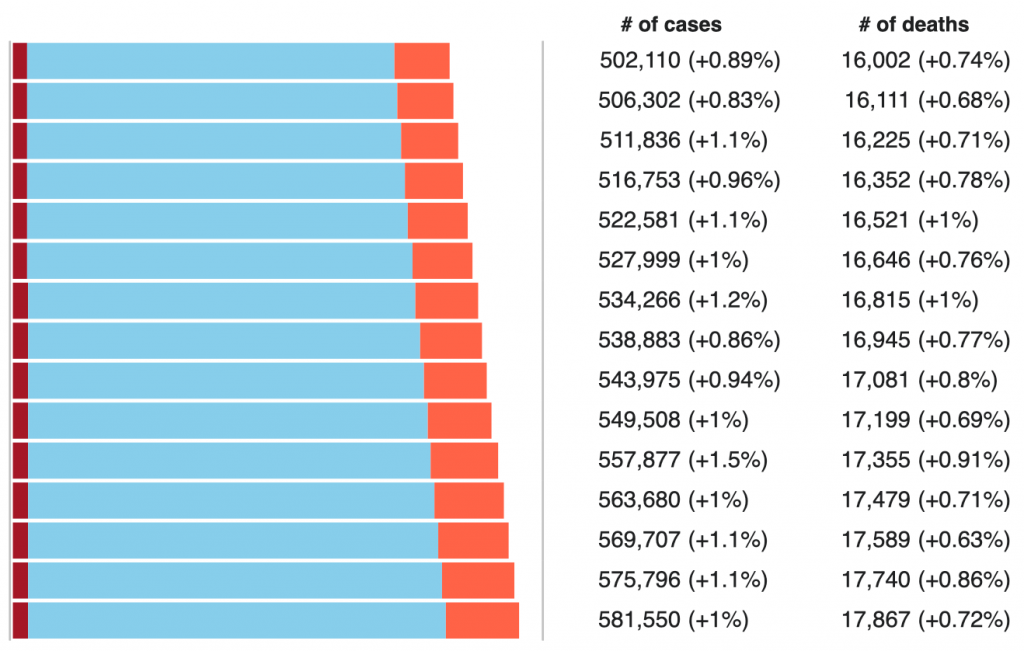Coronavirus Update #41, 2020
Cumulative number of reported cases: 581,550 (as of December 7)
Recovered: 479,302
Deaths: 17,867

Rupiah to US$14,135
Jakarta Stock Exchange Index: 5930
Overview- Situation Worsens
Indonesia, 9 months into the COVID pandemic, has not improved conditions; the spread of the disease continues. A frustrated President Jokowi continues to lash out: on November 30 he addressed his Cabinet: “Everything is worse!”, he exclaimed. Hospital occupancy is rising as well as case totals. 4 provincial governors recently tested positive, including Jakarta Governor Anies Baswedan, who joined a larger “superspreader” event celebrating the return of a controversial cleric, Rizaq Habib. Recent new daily case numbers are among the highest since the pandemic began. Volcanic activity in three regions (Central Java, East Java, and East Nusa Tenggara) has displaced thousands into temporary shelters raising the risks of increased transmissions.
The Jakarta Provincial Government has extended the Large-Scale Social Restrictions (PSBB) transition period for 14 days, from December 7 to 21 as Covid-19 case numbers continue to rise.
Indonesia has received 1.2 million doses of a Covid-19 vaccine made by China’s Sinovac. Indonesia’s Covid-19 response team chief Airlangga Hartarto said on Monday (12/7) the first batch of doses will be examined by the food and drug agency, with plans to distribute them to medical workers and other high-risk groups.
In a decree signed by Indonesia’s Health Minister Terawan Agus Putranto on Dec. 3, the government has stipulated that the vaccines that can be used for vaccination programs in Indonesia must come from local pharmaceutical company PT Bio Farma, United Kingdom-based AstaZeneca, China’s Sinopharm or Sinovac Biotech, or US pharma Moderna. The vaccine being jointly produced by US firm Pfizer and German company BioNTech also made the list.
Travel- US Defense Secretary Visits
The acting U.S. secretary of defense, Christopher Miller, met with Indonesian Minister of Defense Prabowo Subianto in Indonesia on Monday (12/7) to discuss bilateral defense relationships and securing a free and open Indo-Pacific region. After Indonesia, Miller will head to the Philippines.
Economic-
- Arrests: Two Cabinet ministers were recently arrested for corruption. Indonesia’s social affairs minister Juliari Batubara turned himself in to anti-corruption authorities on Sunday (12/6) to face charges of taking bribes related to the government’s COVID-19 aid distribution. Fisheries Minister Edhy Prabowo was arrested in an alleged bribery case involving the issuance of permits for aquaculture and/or fishing businesses and marine commodities in 2020.
- Shares Up: Indonesian shares soared 2% to a near 10-month high on Monday (12/7) as reports of the arrival of the first shipment of China’s coronavirus vaccine and central bank promises of low interest rates countered regional concerns over U.S.-China tensions.
- Tourism figures down: Statistics Indonesia (BPS) announced that the number of foreign tourist visits to the country in October 2020 declined drastically up to 88.25 percent, which was recorded 158,190, compared to October last year.
- Bank Indonesia policy: Bank Indonesia (BI) will maintain its loose monetary policy stance and keep its benchmark interest rate low in 2021 to support the economic recovery while pledging to strengthen and develop the country’s digital payment system. BI Governor Perry Warjiyo said the central bank would continue to use all its policy instruments to pursue economic recovery next year, projecting the economy to rebound by 4.8 percent to 5.8 percent of growth.
- Sovereign Wealth Fund: Japan will invest US$4 billion in Indonesia’s planned sovereign wealth fund through the Japan Bank for International Cooperation. Earlier the US International Development Finance Corporation (DFC) pledged $2 billion. Recently enabled by the Omnibus Law on Job Creation, the fund is designed to support the highly leveraged state-owned enterprises in the infrastructure sector. AICC has long advocated for private sector involvement in infrastructure.





